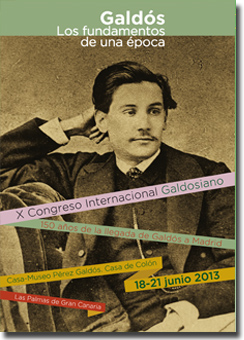EL «SENTIMIENTO DE LA HISTORIA» GALDOSIANO FRENTE A LA HISTORIA OFICIAL / THE GALDOSIAN «SENTIMENT OF HISTORY» IN CONTRADICTION TO ACTUAL HISTORY
Palabras clave:
Configuración, Tradicionalistas, liberalismo, sentimiento, religión, modernidad, configuration, Tradicionalists, liberalism, official history, religion, modernismResumen
El conflicto de las dos Españas, la tradicionalista y la liberal, es tan consustancial a la obra de Galdós como su preocupación por el problema religioso, de ahí que sus contrarios ideológicos lo tildaran de anticlerical, aunque en realidad sólo pretendía criticar las conductas inapropiadas de algunos clérigos y de la misma institución. Frente al discurso de la ‘historia oficial’, el autor contrapone su particular concepción de la historia, es decir ‘el sentimiento de la historia’, que en Doña Perfecta llevará hasta sus últimas consecuencias, puesto que los sentimientos personales de la protagonista principal se elevan a premisas nacionales desde el momento que se vale de la situación de preguerra para destruir a Pepe Rey —su adversario político-religioso— trascendiendo a la gran historia.
The conflict of the two Spains, the traditional and the liberal, is just as integral to the work of Galdós as his concern for the religious problem. Hence, their ideological opposites labelled him as anticlerical, but he actually only wanted to criticize the misconduct of some clergy from the same institution. Facing the discourse of ‘official history’, the author contrasts his particular conception of history, this is to say ‘the sentiment of history’, that in Doña Perfecta he brings it to a logical conclusion, since the personal feelings of the main character rise to a national level since the moment that uses the pre-war situation to destroy Pepe Rey —her political-religious opponent— transcending the grand history.




